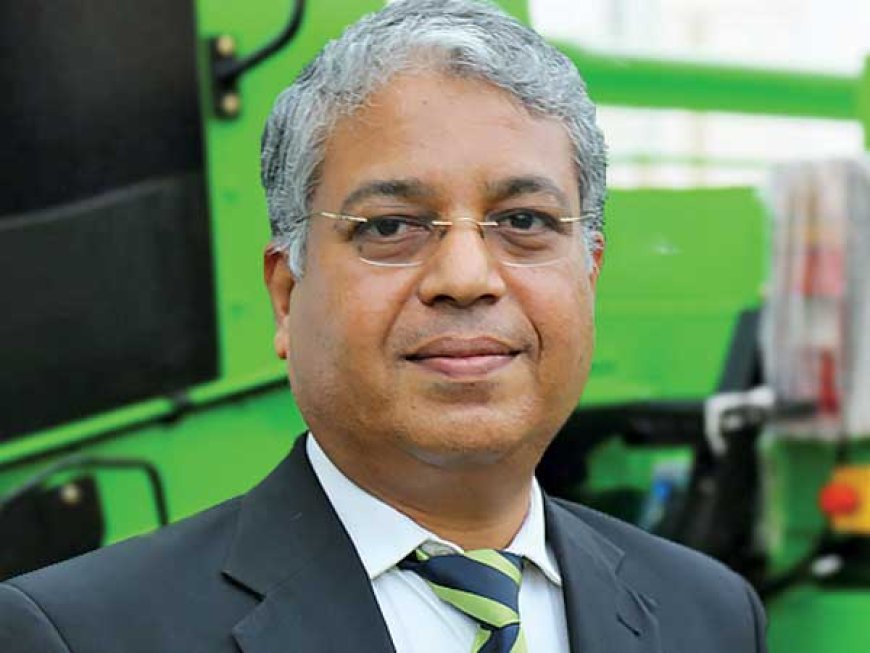Gujarat has consistently been a pioneer in India for infrastructure development.
V G Sakthikumar, Chairman and Managing Director, Schwing Stetter India Could you share your thoughts on the Gujarat Conex exhibition and the products you have chosen to showcase? We are primarily focusing on products that are relevant to the ongoing

Could you share your thoughts on the Gujarat Conex exhibition and the products you have chosen to showcase?
We are primarily focusing on products that are relevant to the ongoing projects here in Gujarat. At the moment, we consider this exhibition more of a regional event rather than a national one. Our selection of products is tailored to the specific needs of this region. However, with the support of the Gujarat Contractors Association (GCA), we anticipate a substantial number of visitors. Based on our experience here, we will determine how to approach the next edition of this exhibition.
How has the exhibition been so far?
We have already noticed some interesting visitors, including individuals from outside India. This indicates that India’s standing on the global stage is evolving, with more people considering us as an alternative source for traditional machinery. This presents a great opportunity for everyone to offer high-quality products tailored to the specific needs of these destinations, and we can build on this momentum rapidly.
What are your views on the Gujarat market?
Gujarat has consistently been a pioneer in India for infrastructure development. For instance, when it comes to ports, Gujarat developed Azira and Mundra long before other states even considered building ports. The first freight corridor also originated in Gujarat. Similarly, the first high-speed train project covered a major portion of Gujarat. Even city development projects like Dholera were initiated here. What happens in Gujarat often sets a trend for the rest of the country. Therefore, it’s crucial that we remain focused on this region. We’ve made substantial investments here, with offices in Ahmedabad, Surat, Rajkot, and around 50 employees statewide, with half of them dedicated to services. We’re expanding our business beyond concrete into other areas, especially traded products like XCMG.
I understand you’ve embarked on a significant sustainability initiative.
As part of our 25th anniversary celebration, we committed to planting around 250,000 trees. We started this initiative in Assam and Chennai. In Assam, we had the privilege of Mr. Jadhav, a Padma Shri Awardee, participating in our event. As of now, we’ve planted 178,000 trees, with the remaining 72,000 to be planted in the next couple of years. We are also working on a 1.2-megawatt solar project, ensuring more than 25% of our energy comes from green sources. This is just the beginning of our sustainability journey.
Regarding your product lineup, are you exploring alternative fuels?
We have already introduced an electric vehicle (EV) at BC India, and we have pending orders for it. The machine is currently undergoing testing, and once it passes, we’ll begin regular production. We also have plans to introduce EVs for other applications in the future. Additionally, we’re working on products that are more fuel-efficient and compatible with bio-blended fuels, although this is dependent on engine manufacturers.
Can you tell us about your initiatives for skill development?
We’re actively involved in skill development through our participation in the IESC. We’re a major contributor to certification programs. We’ve signed MOUs with several states, starting with Uttarakhand, where we’re providing training in collaboration with state polytechnics. We’ve extended this initiative to Assam, Tamil Nadu, and are in discussions with Bihar, Uttar Pradesh, Karnataka, and Kerala. Additionally, we run two welding schools in our factory to train and certify welders. We’ve also partnered with Vellore Institute of Technology and SRM University for diploma engineer courses and internships.
How do you see the concrete equipment segment in the coming years?
Concrete equipment is set to perform well in the coming years. It’s essential for a wide range of projects, from ports and airports to high-speed trains and highways, as well as nuclear and hydroelectric power projects.
Could you share insights into your market share?
We have a diverse product portfolio, making it challenging to provide a single company-wide market share figure. However, we’re leading in the concrete segment across the board, and in self-loading mixers, we’re on track to become the number one player soon. In horizontal drilling machines and crawler cranes, we’re already leaders. In the excavator segment, we’ve rapidly moved to fifth position within just three years, and we aim to become one of the top excavator manufacturing companies in India in the near future.
With next year being an election year, do you anticipate any challenges?
Elections can bring challenges in terms of business volumes. However, our company has experienced this pattern in past election years, and we believe in the long-term success story of India. We’ve seen growth recover after elections in 2009, 2014, and 2019. During any slowdown, we focus on improving our capabilities and product offerings to ensure our continued success.
How about spare parts availability for your products?
We understand that timely availability of spare parts is crucial for our customers’ satisfaction and their decision to choose us again. So far, we’ve been smoothly meeting this demand. We’re aware that some of the machines we’ve introduced, such as the 2000-tonne crawler, are unique in India. We’re also entering new areas like trench cutters. We’re confident that these ventures will lead to good business opportunities, and we remain dedicated to exceeding customer expectations in the construction and mining industries.
Hits: 5








